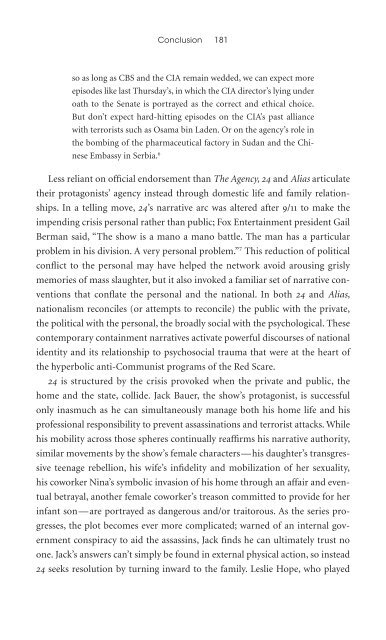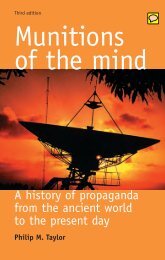Citizen-Spy
Citizen-Spy
Citizen-Spy
Create successful ePaper yourself
Turn your PDF publications into a flip-book with our unique Google optimized e-Paper software.
The Irrelevant Expert 71<br />
ington framed the show in terms of the legitimate threats offered by America’s<br />
Communist adversaries. The result is a confusing, contradictory text; the anti-<br />
Communist, civic address of the show differed very little from such “documentary<br />
melodramas” as I Led 3 Lives and Behind Closed Doors, yet World of Giants<br />
clearly strains the limits of believability. When in the final credits Mel turns to<br />
the camera and says, “In the meantime, be careful—the little man could be<br />
you!” one isn’t sure whether to wince or laugh.<br />
World of Giants approaches, but can’t quite cross, the threshold between the<br />
state-sponsored espionage dramas of the 1950s and the spy parodies of the<br />
1960s. As Susan Sontag wrote of camp, “The essential element is seriousness, a<br />
seriousness that fails. Of course, not all seriousness that fails can be redeemed<br />
as Camp. Only that which has the proper mixture of the exaggerated, the fantastic,<br />
the passionate, and the naïve.” 50 What makes World of Giants so difficult<br />
to characterize is precisely this sort of earnestness—the palpable dramatic tension<br />
and the passion with which it treats the political context of the Cold War.<br />
In retrospective viewing of the program, one gets the impression that a delicate<br />
balance is nearing collapse; the precarious combination of official state politics<br />
with narratives of adventure and intrigue has reached the very limits of plausibility.<br />
Within a few short years, this tension between the agent and the state<br />
would give way, leading to increasingly referential and playful narratives. But<br />
here, there is no parody—only earnest patriotism, spoken through an impossibly<br />
fantastical narrative.<br />
For different reasons, neither World of Giants nor Behind Closed Doors were<br />
commercially successful, and they’ve largely disappeared from view in most<br />
histories of the period. Still, they each offer particularly revealing glimpses into<br />
a television industry in transition. Both were created at the tail end of a period<br />
of close correspondences between narrative televisual representations and state<br />
politics; both also invoked the narrative styles of documentarism that linked<br />
spy programs of the early to mid-1950s to specific federal agencies. The economic<br />
and political dependencies that generated those narrative styles, however,<br />
were fragmenting by the end of the decade. Emerging from their first<br />
decade as powerful institutions in their own right, the television networks were<br />
likely less concerned about winning federal approval than they once had been.<br />
Sponsors—once the most powerful direct influence on many kinds of programming—were<br />
losing control, and by the late 1950s, the networks would



